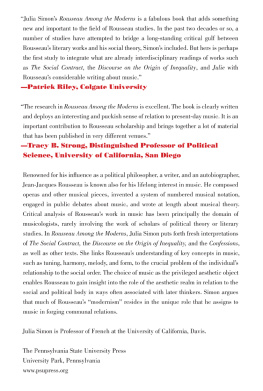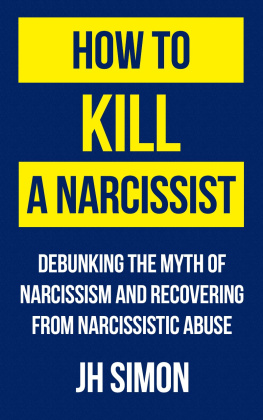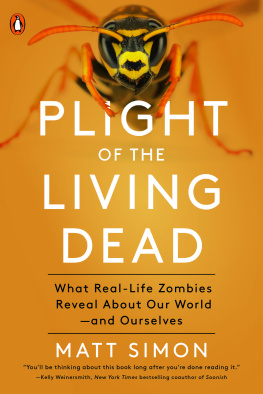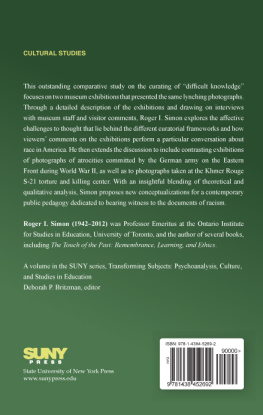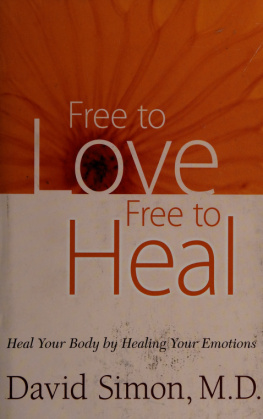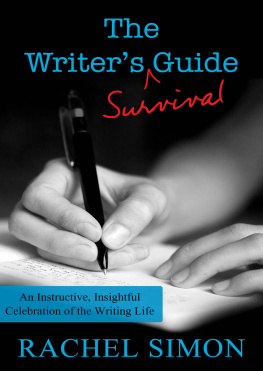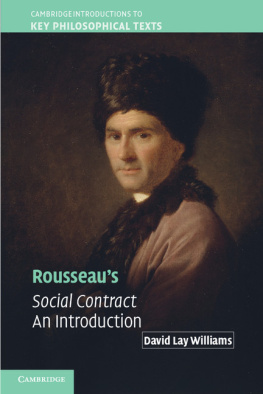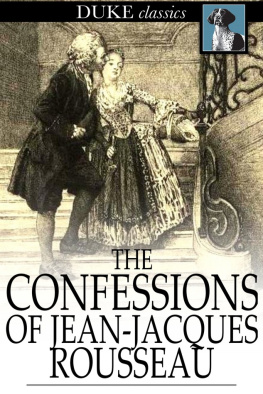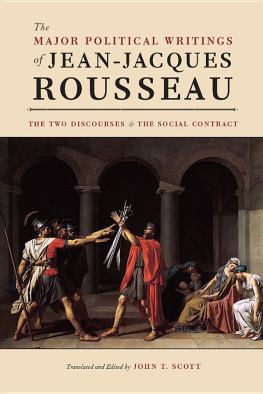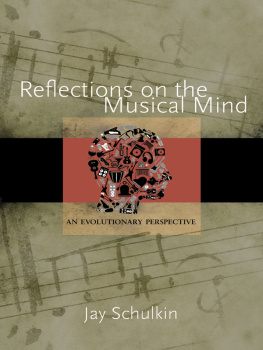ROUSSEAU AMONG THE MODERNS


Library of Congress Cataloging-in-Publication Data
Simon, Julia, 1961
Rousseau among the moderns : music, aesthetics, politics / Julia Simon.
p. cm.
Summary: Reevaluates Jean-Jacques Rousseau through the lens of music theory to question his contribution to thinking about music as an aesthetic force in social life. Links Rousseaus understanding of concepts in music to the problem of the individuals relationship to the social orderProvided by publisher.
Includes bibliographical references and index.
ISBN 978-0-271-05958-7 (cloth : alk. paper)
1. Rousseau, Jean-Jacques, 17121778KnowledgeMusic. 2. Rousseau, Jean-Jacques, 17121778Criticism and interpretation. 3. MusicPhilosophy and aesthetics. 4. MusicPolitical aspects.
I. Title.
ML410.R86S56 2013
780.92dc23
2012047292
Copyright 2013 The Pennsylvania State University
All rights reserved
Printed in the United States of America
Published by The Pennsylvania State University Press,
University Park, PA 16802-1003
The Pennsylvania State University Press is a member of the Association of American University Presses.
It is the policy of The Pennsylvania State University Press to use acid-free paper. Publications on uncoated stock satisfy the minimum requirements of American National Standard for Information SciencesPermanence of Paper for Printed Library Material, ANSI Z39.48-1992.
This book is printed on Natures Natural, which contains 30% post-consumer waste.
TO MY MOTHER, Rene Simon
CONTENTS
1
Performance, Rhythm, and the Constitution of Community
2
Singing Democracy: Music and Politics
3
Rameau and Rousseau on Absolute and Relative Value: The Theory/Practice Problem
4
Folk Music: Authenticity, Primitivism, and the Uses of Roots Music
5
Rousseau and Aesthetic Modernity: Musics Power of Redemption
ACKNOWLEDGMENTS
This book is dedicated to my mother, Rene Simon, who made sure I was exposed to music at an early age. My mother was the impetus behind the presence of the baby grand piano in our house growing up. I have fond memories of listening to her play a wide variety of music, from waltzes to popular songs. In some ways, she inspired my own desire to play. And once I started, she dutifully took me to music lessons, listened to hours of practicing and, most especially, attended every band concert and solo I ever performed. My mother provided the nourishing and supportive environment for my early musical proclivities.
Academic studies and an initially nonmusical career path moved my interests away from music. No longer a performer, I was content to listen. My return to music was sparked by my husband, Charles Oriel, who has been an inspiration to me in reconnecting with this passion that had become submerged. Playing and performing together has inspired a great deal of the thinking that forms the backdrop of this project. I am grateful to Charles for bringing me back to my passion for music. Performing has enabled me to experience many of the feelings and emotions that are central to my conceptualization of this project. Charles has also patiently listened to hours of musings on a wide variety of topics, read draft after draft, always with the cheerful support and encouragement of someone who truly believes along with me. His thought-provoking comments and insights have added immeasurably to the project.
My daughter, Sabina, also inspired the return to music. Singing to her, taking her to music lessons, and generally watching a passion for music develop in her reminded me of how much it meant to me. I am especially happy to be able to share a love of music with her.
Reconnecting with playing music led to thinking about Rousseaus writing on music. I want to thank Claude Dauphin from the Universit du Qubec Montral for organizing the 2001 Rousseau Association meeting dedicated to Musique et langage chez Rousseau. The conference afforded me the occasion to get my feet wet writing about Rousseaus work in music. I also wish to thank my wonderful colleagues and friends from the Rousseau Association who have inspired and challenged me over the last ten years to think about Rousseau in so many fruitful ways: Chris Bertram, Mira Morganstern, Ourida Mostefai, Michael ODea, John Scott, and Byron Wells.
My colleagues at The Pennsylvania State University and at the University of California, Davis, have also helped me to think carefully about the thorny questions of interdisciplinary research. I am especially grateful to Vera Mark and Joan Landes at Penn State and to Juliana Schiesari, Noah Guynn, and Anna Maria Busse Berger at UC Davis. I also wish to thank wonderful graduate and undergraduate students who have inspired me throughout the project. Finally, I am especially grateful to Tracy Strong for helpful criticism of early drafts of the manuscript and to Dick Terdiman for his support and encouragement over many, many years of professional and personal growth.
Two chapters of this book represent versions of earlier articles. I thank The Journal of the History of Ideas for permission to reprint a revised version of Singing Democracy: Music and Politics in Jean-Jacques Rousseaus Thought, which originally appeared in volume 66 (2005): 43354. I also thank Eighteenth-Century Music and Cambridge University Press for granting permission to reproduce a revised version of Rousseau and Aesthetic Modernity: Musics Power of Redemption, which originally appeared in volume 2, no. 1 (2005): 4156. Finally, I am grateful to several librarians who helped me to track down an eighteenth-century edition of Rousseaus Dictionnaire de musique in order to be able to reproduce plate N: Mike Winters at UC Davis, Eunice Schroeder and Tom Moon at UC Santa Barbara, and Sarah M. Allison, Caitlin St. John, and Gwido Zlatkes at UC Riverside.
A NOTE ON THE TEXT
All parenthetical references to works by Rousseau are to Jean-Jacques Rousseau, euvres compltes, edited by Bernard Gagnebin, 5 vols. (Paris: Gallimard, 195995). Internal citations refer to volume and page number. Translations are my own unless otherwise indicated.
The Encyclopdie ou dictionnaire raisonn des sciences, des arts et des mtiers, edited by Denis Diderot and Jean LeRond dAlembert, is available online at the ARTFL Encyclopdie Project website (http://encyclopedie.uchicago.edu/). All references to the Encyclopdie in the notes are to this website, which can be searched by keyword.
NOTES
INTRODUCTION
For a study of Rousseaus influence on the Revolution itself, see Swenson, On Jean-Jacques Rousseau. See also Peter Gays introduction to Cassirer, Question of Rousseau. Gay writes, The influence of Rousseaus doctrines has been immensethey left their mark on the most diverse spirits and movements. Burke execrated Rousseau as the very embodiment of the Age of Reason. De Maistre and Bonald condemned him as the advocate of an irresponsible individualism and as the philosopher of ruinous disorder. Later critics, such as Sir Henry Maine, attacked him for establishing a collective despot and for reintroducing, in the Contrat social, the old divine right of kings in new dress (4; internal quotes from Henry Maine, Popular Government [New York: Holt, 1886], 157, 160).
In response to Derridas reading of Rousseau, de Mans
Next page
